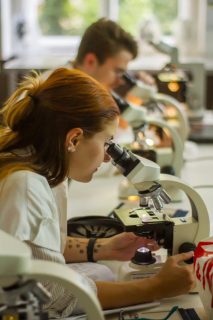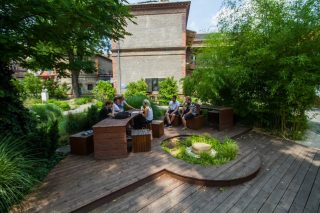At the well-equipped UVMB clinics you will get practical training in every vet related field:

Final exams are typically oral, semi-finals and mid-terms are both oral and written.
All graduates of the Budapest veterinary school have had their diplomas accepted, or easily passed the local board exam (where it was needed) at their home countries and they are working as fully licensed veterinarians.
 students get all the necessary help and support to settle down, get adjusted to their new life and become successful in their studies
students get all the necessary help and support to settle down, get adjusted to their new life and become successful in their studiesAccording to several surveys (for example: LeFigaro.fr), Budapest is the cheapest university city in Europe for international students.
Stipendium Hungaricum (Hungarian state scholarship) www.stipendiumhungaricum.hu
The University of Veterinary Medicine Budapest seeks students with
Admission is granted based on an entrance exam (the students’ educational background in science subjects is not relevant as long as they take a successful entrance exam).
The entrance examination aims to test (in oral and written form) knowledge in Biology, Chemistry, competency in English language in general and also in relation to academic subjects.
Entrance exams are organized online or in person in several countries all around the world.
Easy application process – documents you will need:
How can you apply?
Applications are accepted on a rolling basis until 30 June each year. In case of vacancies further applications are also welcome until the end of August. Students or their local representatives need to apply via the apply.univet.hu website by uploading the application documents and paying the application fee.
“In my opinion it’s an amazing profession since we can help the creatures that are not able to ask for help. That’s why I chose the veterinary profession.” Petra, Sweden
“Being a vet student is challenging. We have a lot of studying to do, obviously, but the students at the university really help each other. So, after being here four years now, it’s like having a huge family.” Cecile, France
“I wanted to have a good experience with studying abroad and I found that this university with this long tradition as it has, it’s been like really really exciting to actually be a part of the long tradition that has been like here. And it has been a proper uni. ” Emma, Sweden
“I really enjoy the practicals because we can see the animal in another way, so we can see the direct connection with our future job. ” Amandine, France
“Budapest is a really nice, beautiful city, I really enjoy the time here. There are different kinds of events here for students, you can hangout with your friends. Also, the university provides events for students, especially trips, they are really good.” Pawel, Poland
“I love this city, it’s so living, it’s amazing, and you are always discovering something new, and the people are awesome, the culture is really nice.” Joganah, Mauritius